I’d rather talk to my Goldfish: A (failed?) Twitter experiment
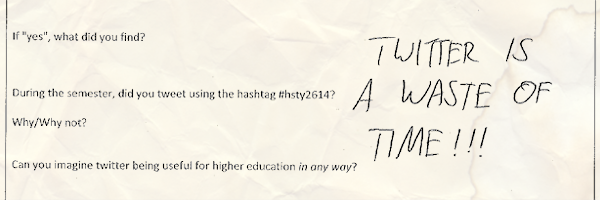
We often here how today’s students love technology. So do I. I also like to play a bit and try and see how we can best use it to enhance our higher education teaching.
This past semester I’ve been teaching Australian Social History (HSTY2614), a survey course which spans from 1918 through to today. As lead tutor for the course, I tried to engage the students through a range of online initiatives. This included a set of online resources available through the custom bit.ly address bit.ly/hsty2614; email updates providing responses to in-tutorial activities such as setting class rules and a stop/start/continue peer -review exercise; a webCT site offering lecture recordings; and (something new) a twitter hashtag for the course.
Twitter is what I discuss here.
The format of our tutorials
For people unfamiliar with the format of courses at Sydney, students attend two hour-long lectures each week, and one hour-long seminar-style tutorial. Within the tutorials, students discuss set readings for the week, typically three journal articles or book chapters. The cohort was just over 150 students, grouped into six tutorials of twenty-five students. I took five tutorials, and course-coordinator Penny Russell took one.
Assessment comprises one 3,000 word essay (60%), and a choice of a 1,500 word reflective essay or a formal exam (30%), and tutorial participation (10%).
Tweet your readings
It’s important that students complete the set readings, and take part in tutorial discussions so that they get a good understanding of the course material in preparation for the reflective paper or formal exam, which asks them to thing broadly across the course as a whole. I’m a firm believer in paraphrasing while note-taking (see this blog for a good outline of its advantages).
Ideally, by the end of the semester, each student should have a collection of concise summaries of each reading to draw from when they write this assessment.
A couple of years back one of my colleagues joked that he told his students to think of their summaries like tweets: keep them as short, succinct, and as to the point as possible.
The theory sounded good. I figured that it wouldn’t hurt to try this approach for real. #YOLO
At the start of semester, I encouraged my students to post summaries, comments, observations on the week’s readings on Twitter.
In addition, I also posted up various reminders, frequent links to relevant primary sources (videos, documents, pictures) available on the web, and made it clear that I would be happy to answer questions and queries via twitter.
My objective was to build enough momentum to get a self-perpetuating discussion rolling. I hoped that employing tweeted comments and summaries might be a nice way to open discussions during tutorials.
I foresaw some distinct advantages to Twitter:
- Concise summaries are always better than underlines;
- It’s short format forces us to choose words carefully; an important skill;
- It could provide an opportunity for people who are shy in tutorial discussions to contribute, or at least demonstrate their engagement with the course material;
- It could be a potential conversation-starter for tutorial discussions;
- It could be an open-access way for students to raise questions about the course. This tends to be done by email, which often results in the same questions being addressed multiple times.
There were also some potential pitfalls:
- Is it appropriate to require students to sign up to a service like Twitter, where they are required to divulge their personal details to a third party?
- Would difficulties arise whereby students who already have Twitter accounts want to keep their personal tweets separate?
- University conventions prevent the assignment of additional compulsory and/or assessable tasks. So while I could encourage students to post on Twitter, I couldn’t really compel them in any way. (This could, of course, be rectified in the future, but would require reducing other assessable elements of the course.)
What others have done
By coincidence, about six weeks after my programme started Sociable Blog posted a piece on “How College Professors are Using Twitter to Re-engage their students“.
They made many of the observations I had:
- Post updates on the course;
- Test-Prep and extra credit;
- Live Q & A Sessions;
- Interaction beyond the classroom;
- Personal branding.
So what happened?
Not much. As you can see from the chart below, the number of tweets each week stayed very low, particularly when you take out my own two or three weekly tweets.

Number of tweets using hashtag #hsty2614 during the semester. Tweets peak during week 5.
There was initial interest from at least one student (of 150!):

Momentum picked up fairly quickly, with four people (out of 150 !) tweeting by weeks 4 and 5. And some good stuff too:
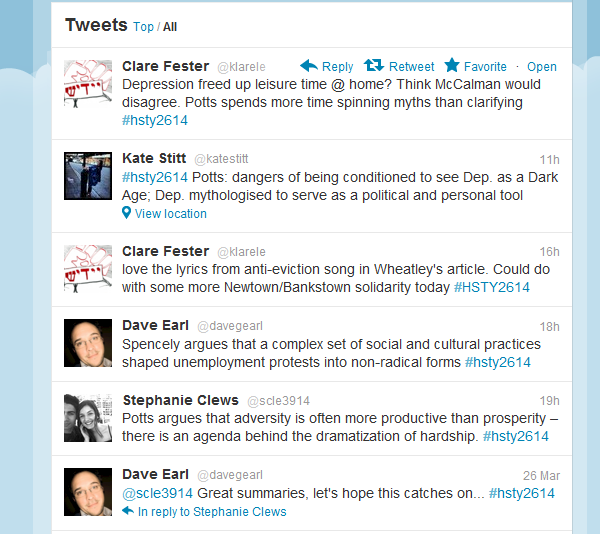
Once (once!) a student mentioned lecture content, spontaneously:

And twitter was also used (once!) to ask a question about the week’s content:


By the middle of the semester, however, the handful of nascent tweeters had dropped out, leaving myself as the sole tweeter.
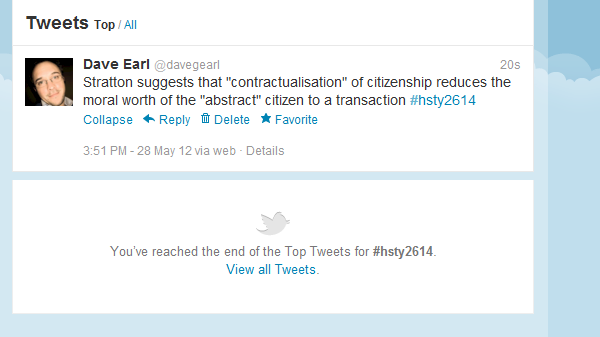
In the event, there simply wasn’t enough volume to build momentum. As only one or two people posted in the earlier weeks, I certainly didn’t want to discourage them from posting more due to being ‘put on the spot’ at the start of class by leading discussions using their tweets. The idea had potential (I still think it does), but really didn’t meet it. Why?
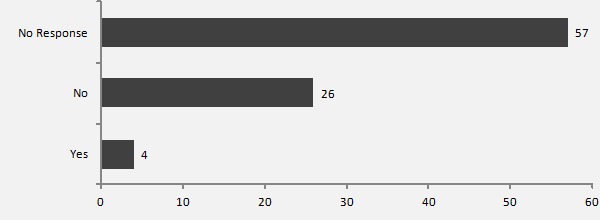
During the semester, did you tweet using the hastag #hsty2614?
In the last week of semester, I circulated an additional feedback form to my students probing their use of social media, the internet, and (particularly) twitter. There were 87 responses, about half of the course participants.
In the feedback, only 4 people claimed to have tweeted regarding #hsty2614. The real figure, by my calculations, would have been eight or nine. This is still pretty poor amongst such a large group.
What went wrong?
First up, I greatly underestimated the number of students in the course who had twitter accounts:
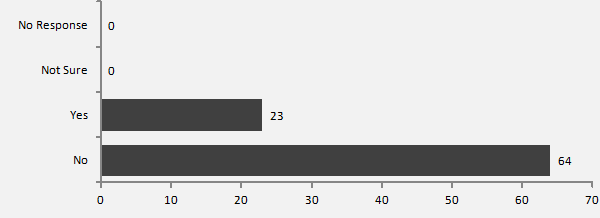
Do you have a twitter account?
I had guestimated maybe half to three-quarters of the students would already have a twitter account. The number was closer to a quarter. Of those, only a handful could be regarded as frequent twitterers:
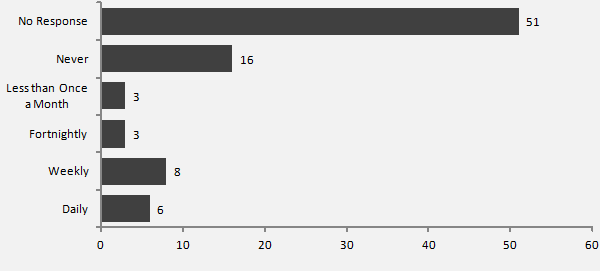
(If you have a Twitter account) how frequently do you tweet?
The number of participants was also potentially reduced by a reluctance to use their existing (personal) account for study purposes. Some telling responses to “Why didn’t you tweet” included:
I don’t mix business with pleasure.
Twitter is a personal place where I rant about my feelings- often my hatred of uni courses.
I don’t like twitter, and even if I had it, I wouldn’t want to use it for uni.
It’s more of a social tool.
I didn’t see the point of it: esp the format of it being a summary of the reading + it would be essentially irrelevant spam to my followers.
So why didn’t people tweet? Generally, not having an account, “sheer laziness,” a lack of incentives, and a lack of tweets from peers all contributed:
I only did it once and the only reason I didn’t do it again was pure laziness.
Too much trouble. and I hate the idea of twitter.
Just never thought to do it/didn’t want to say the wrong thing.
No one else would have done it I don’t have an account.
I thought it was a good idea but because it wasn’t required I didn’t feel compelled.
There wasn’t really any incentive, people would be more likely to participate if there was. ie. participation points for tweeting throughout the semester.
One theme that came up fairly consistently was a feeling that not enough people used Twitter at this stage:
I think people were reluctant to use it because not everyone uses twitter anyway in their daily lives.
I would have used it if I had a Twitter account.
It seems to be a social network picking up steam and could possibly facilitate student discussion outside of class.
Not many people use it. Facebook would be a better platform
Could be another important source if enough people used it.
There was a level of scepticism regarding Twitter and social media for Higher Education purposes, generally:
I do not feel it is a proper way to engage.
Social networking can be useful, however I feel that it’s use in education tends to be tokenistic.
I think twitter is a bit of a gimmick
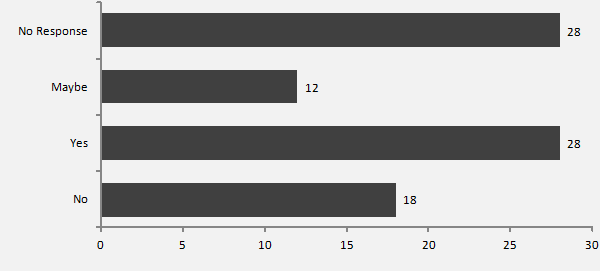
Can you imagine Twitter being useful for higher education in any way?
At the same time, about half the group could imagine social media being useful in some way. Open responses included:
Yes, once more people use it (inevitable) it can keep people updated w/ due dates, suggestions, for news/articles/extra readings etc.
As twitter becomes more popular this will be a good idea.
Same as facebook it keeps people connected and encourages continuing discussion.
Those few people who did tweet seemed to find it useful (Why did you/why didn’t you tweet?):
Yes [I tweeted] because I thought it would be fun.
[No but] I should have done! And wish I did b/c it would have been good to do summaries.
At the start- wanted to get behind it & use social media within my course I was demotivated by the fact that no one else was tweeting.
As hinted above, there seemed to be a general consensus amongst the tweeters that a lack of peer engagement discouraged them from further tweeting. Some of this is grounded in the fact that few people have twitter accounts, but more so, I think, because even those who did have accounts were reluctant to tweet. Once the momentum of the first few weeks was lost, it was hard to recover.
From those who actually tweeted the feedback was positive:
It forced me to really engage with the readings and develop a better understanding.
I found that it was definitely conductive to my learning.
It is an interactive method of summarising readings that is easy, trendy & forces succinct summaries.
Succinctly summarising is helpful in synthesizing readings/lectures -> 140 characters.
An innovative way to provoke discussion BUT you need to have a sufficient amount of students engaged to benefit.
Yes: small insights, extra readings/videos/events/etc that I want to share with all my fellow students.
I’m a big sharer of info & interesting items on social media & would like to be able to relate to a lot of classmates & help them out if they’re interested- therefore twitter & its #s better for that, rather than facebook.
On the flipside, there was a significant group of people who would rather die than use Twitter:
I think twitter is stupid.
No, reading and hard work constitute learning! Not Tweeting!
(It probably is [useful], just not as conducive as reading the sources and discussing in class).
I don’t like twitter or have any interest in getting an account. Ever. Sorry Dave.
It’s a seductive, banal, idiotic device. If I wanted to reduce my thoughts tp 140 characters, I’d talk to my goldfish.
For a bit of fun, I ran all the open responses through Voyeur Tools, and came up with this:
One think that came up fairly frequently (about ten mentions and a prominent place in the graphic) was students’ preference for a Facebook group rather than a Twitter hashtag. This was a small surprise, as I personally use Twitter for work (it’s public), and save Facebook for personal stuff. I’m aware that students in history courses at Sydney have started Facebook groups themselves, and I’d encourage that. But Twitter does have its advantages, in that messy friend requests and so on are avoided, and the public nature of all tweets should guarantee (to some extent) a level of decorum.
As #twitterstorians know, the platform can be used for a whole heap of useful things, some of which probably haven’t even been discovered.
At the same time, Twitter does have some limitations.
Probably the most significant is the short life of tweets in the search function. Search #hsty2614 today and you’ll find nothing. Further, as Twitter search defaults to “Top Tweets” rather than “All Tweets,” quite a few posts will be hidden below a further layer of complication.
What could be done better?
Explain its purpose more clearly
For a start, I really needed to explain why I thought Twitter might be useful more clearly.
I’ve always tried to emphasise the importance of writing a summary of each reading (rather than simply underlining or highlighting), and have met with some success (and a good level of scepticism) in that regard. On one hand, a tweet-size summary can seem easily digestible, on the other, it might seem daunting to students who already find succinct summaries a challenge.
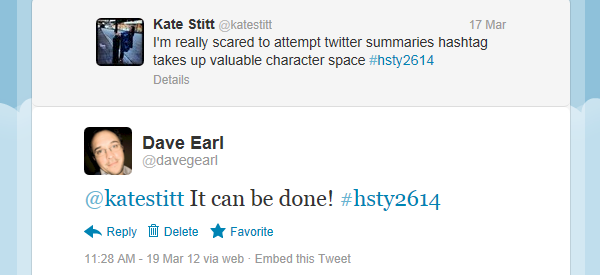
Throughout the semester, I wrote a tweet for every reading. I certainly found it a worthwhile exercise!
In the future I need to more clearly flag its benefits to tutorial participants.
Promote it more
As well as arguing for the benefits of tweeting, I also needed to remind students that it existed. First, this might encourage more people to take it up. Second, it would prevent people forgetting about it altogether:
I forgot about it- only mentioned in the first tute.
Third, it would also provide some encouragement to the people who were already tweeting to keep doing it.
Teach the non-twitterers how it works
Two things came out of the surveys that surprised me. Firstly, the majority of people didn’t know what a hashtag is, or how to search for one.
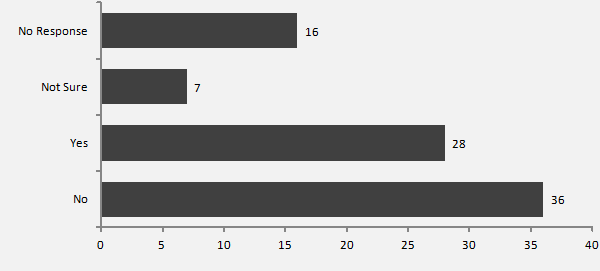
Do you know how to search for a twitter hashtag?
Explaining how to search for hashtags, and encouraging the non-twitterers to search for #hsty2614 may have encouraged more participants, or at least made them more aware that some of their peers were tweeting.
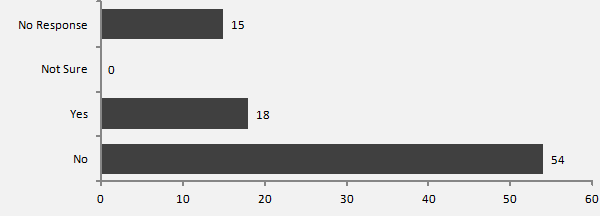
Did you search for the hashtag #hsty2614?
Make it compulsory or assessable
An obvious solution to many of these problems would be to make tweeting compulsory for students, or to include tweeting as part of compulsory assessment. I am of two minds towards this. Past feedback has revealed a rather contradictory effect of assessing student participation: on one hand, some people feel encouraged to participate more if they know they will get “points” for it. On the other, some students get intimated by knowing everything they say (or tweet) is graded; they’d rather say nothing, than say something that might be stupid.
In Conclusion
Despite the (relative) failure of this experiment, I still feel that it can be a useful tool, and its natural 140 character limit can give students (and ourselves) some important practise in concision and clarity. But a bit more work, effort, and forethought is probably required before tweeting your course reaches its potential.
Update: Student Teaching Commendation
After writing the above article, I was very pleased to receive a Student Commendation for my work during the course.
These are unprompted, formal ‘thankyous’ which students can submit to the Faculty if they are particularly impressed by a course or teacher (see: http://sydney.edu.au/arts/teaching_learning/student_commendations/commendation.shtml).
My commendation reads:
“You can tell that Dave is extremely passionate about the subject and wants to incite that same passion within his students. The amount of effort he put in to preparing for this subject was clearly evident through the array of online resources he made available to his students. Dave organised and maintained the twitter hashtag for HSTY2614, which I thought was a really innovative use of social networking for educational purposes; it was immensely conducive to my learning and I hope that it will be used again in other classes. I really wish that more students had utilised this resource and I very much appreciated that Dave took the time and effort to tweet to the HSTY2614 hashtag on a weekly basis. Dave has definitely set the bar high for the rest of the tutors in the History Department, I’m extremely happy with my HSTY2614 tutorials this semester.”

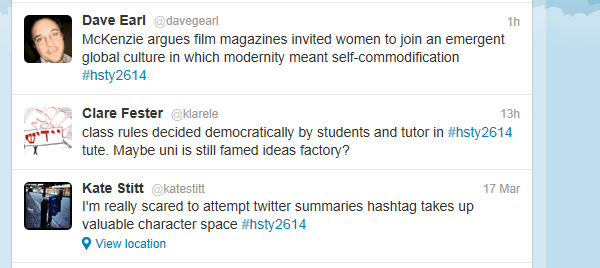
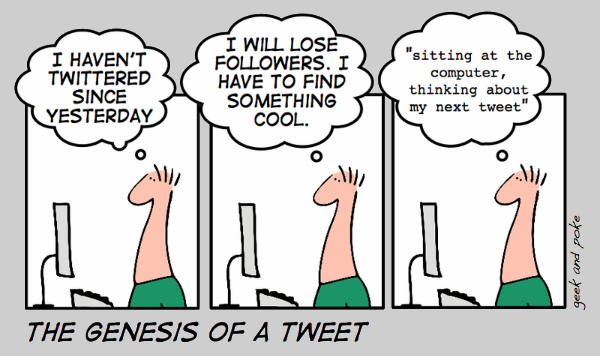
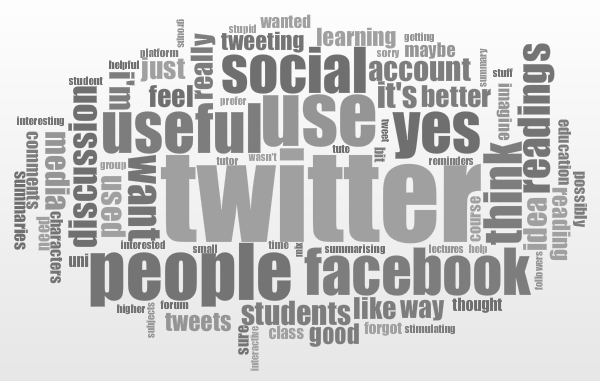
A very interesting read. Would love to see a comparative “experminent” using a closed Facebook group.
I suspect the response would be more enthusiastic because the info remains private and is being piped to where more students actually are.
And the more engaged students could even carry over to following semesters, contributing to the conversation in the long term. You do lose that 140 character discipline, though.
Just a thought. 🙂
Hi Tim, sorry to take so long to reply to this!
In the past, we’ve set up closed discussion groups on the UOS online “blackboards”, but haven’t had a great deal of success getting students to participate. Possibly the “creepy treehouse”.
I know that students have occasionally used Facebook to set up groups on their own initiative, though I suspect this has mostly been to have a moan about things, rather than engage with the course material. I’ve steered clear of these because Facebook is generally a personal place for me, whereas Twitter is generally a professional place.
I’ll (probably) be repeating the experiment in semester 1, 2013, with a few tweaks.
Hi Dave,
Congrats on your experiment and on your wonderful teaching commendation. I agree that it is very important for students to learn to write succinctly and take notes rather than underlining. I found the reading journal a useful form of marked assessment to help develop these skills. However, it may have encouraged students do only one of the assigned readings. (One, of course, is always better than none!) In future I might ask that the journal entry address the week’s theme and draw on all readings, rather than a specific article.
I wonder if using the social media in association with this kind of assessment might provide extra incentive for students? The risk is that students might wish to save their most interesting observations for the the actual assessment, rather than sharing with the group!
Happy New Year!
Micaela
Hi Micaela,
I did advise students that their Twitter participation *could* be counted towards their tutorial participation marks, I intend that make that a bit clearer in the UOS outlines in future. I’m very reluctant to make it compulsory (for a range of reasons, including the trackback below), so I’ll have to tread carefully.
Yes, the commendation was very nice, I’m quite flattered!
Keep well 🙂
Great blog thanks Dave. It’s really interesting to see such a well-documented break down of your experiment. Twitter is such a great tool for discussion and information-sharing in the professional world, I don’t see why this couldn’t work in Higher Education. Will keep an eye out for further developments in your courses 🙂
Cheers,
Penny